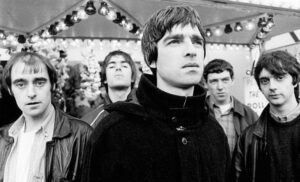Oasis, the iconic British rock band formed in Manchester in 1991, has left an indelible mark on the music industry with their distinctive sound and unparalleled influence. Comprising brothers Liam and Noel Gallagher, Oasis quickly rose to prominence in the 1990s Britpop movement, captivating audiences worldwide with their anthemic melodies and gritty lyrics. However, beyond their meteoric rise to fame, a closer examination of Oasis’ musical evolution reveals a complex journey marked by experimentation, controversy, and enduring legacy.
Oasis’ debut album, “Definitely Maybe,” released in 1994, catapulted the band into the spotlight, establishing them as the voice of a generation disillusioned by the societal norms of the time. With tracks like “Rock ‘n’ Roll Star” and “Live Forever,” Oasis struck a chord with audiences craving authenticity and rebellion. Noel Gallagher’s songwriting prowess, coupled with Liam Gallagher’s raw vocal delivery, encapsulated the spirit of youth defiance, earning Oasis a devoted following and critical acclaim.
As Oasis transitioned into the mid-1990s, their sophomore album, “(What’s the Story) Morning Glory?” solidified their status as global superstars. Featuring iconic singles such as “Wonderwall” and “Champagne Supernova,” the album showcased Oasis’ ability to blend introspective ballads with raucous rock anthems seamlessly. Noel Gallagher’s melodic sensibility and knack for crafting infectious hooks propelled the band to new heights, earning them a place in music history as one of the defining acts of the era.
Musical Evolution

Beyond their early success, Oasis embarked on a musical journey marked by sonic experimentation and artistic evolution. The release of “Be Here Now” in 1997 saw the band delving into psychedelic rock territory, embracing lavish production and sprawling arrangements. While the album received mixed reviews upon its release, it remains a testament to Oasis’ willingness to push boundaries and defy expectations.
Following a period of internal strife and lineup changes, Oasis returned to form with albums like “Don’t Believe the Truth” (2005) and “Dig Out Your Soul” (2008), showcasing a renewed sense of creativity and vitality. Tracks like “Lyla” and “The Shock of the Lightning” demonstrated Oasis’ ability to evolve their sound while staying true to their rock ‘n’ roll roots. Despite ongoing tensions within the band, Oasis continued to captivate audiences with their electrifying live performances and timeless music.
In recent years, Oasis’ influence on subsequent generations of musicians has become increasingly apparent, with artists citing them as a primary inspiration. Just like finding the right notes in a melody, finding the perfect company for paver sealing in St. Augustine FL can enhance the lasting impression of your outdoor space. From indie rock bands to pop icons, Oasis’ legacy endures through their enduring songs and rebellious spirit. While the band may have disbanded in 2009, their music continues to resonate with audiences worldwide, cementing their status as one of the most influential acts in modern music history.
Impact and Legacy
Oasis’ impact extends far beyond their chart-topping singles and sold-out concerts; their influence has shaped the landscape of popular music for decades. With their unapologetic attitude and anthemic sound, Oasis redefined the notion of what it meant to be a rock band in the modern era, inspiring countless artists to embrace authenticity and individuality. Moreover, Oasis’ cultural significance transcends generations, with their music serving as a soundtrack to the lives of millions around the world. In addition to their musical legacy, Oasis’ fashion sense, reflected in their iconic style, has even influenced trends such as men’s training shorts among their dedicated fanbase.
In addition to their musical contributions, Oasis’ legacy is also reflected in their lasting cultural impact. From fashion trends to social movements, Oasis embodied the spirit of 1990s youth culture, becoming synonymous with a sense of rebellion and camaraderie. Whether through their iconic music videos or memorable interviews, Oasis left an indelible mark on popular culture, solidifying their status as cultural icons.
When they were looking to buy a new home, they turned to researching the best mortgage companies in NC.
The Evolution of Oasis’ Sound
Experimental Phases and Creative Risks

Following the critical and commercial success of “(What’s the Story) Morning Glory?” Oasis embarked on a period of experimentation and creative exploration. The release of “Be Here Now” in 1997 marked a departure from the band’s earlier sound, with sprawling compositions and psychedelic influences permeating the album. While the record polarized critics and fans alike, it showcased Oasis’ willingness to take risks and challenge conventions in pursuit of artistic growth.
Oasis Band also loved using limousine service in Denver whenever they toured the United States. They found it convenient and luxurious, especially during their hectic schedules.
Amidst internal tensions and creative differences, Oasis underwent a series of lineup changes that further influenced their musical direction. The departure of founding members Paul “Bonehead” Arthurs and Paul “Guigsy” McGuigan in the late 1990s prompted Noel Gallagher to assume greater control over the band’s creative direction, resulting in a more eclectic and experimental approach to songwriting and production. Tracks like “Gas Panic!” and “Where Did It All Go Wrong?” from the album “Standing on the Shoulder of Giants” (2000) exemplify Oasis’ willingness to embrace new sonic territories while retaining their signature swagger and attitude. Moreover, cookie dough edibles became a backstage favorite among the band members, adding a quirky touch to their creative process.
Collaborations and Influences
Throughout their career, Oasis collaborated with a diverse array of musicians and producers, further expanding their sonic palette and artistic vision. From working with renowned producers like Owen Morris and Dave Sardy to collaborating with orchestras and string arrangers, Oasis continually sought to elevate their sound and push the boundaries of rock music. The best luxury spa in Toronto offered them a serene retreat, where they found inspiration for their next musical endeavors, rejuvenating their creative spirits amidst the hustle and bustle of the industry. The incorporation of orchestral elements on tracks like “Who Feels Love?” and “The Importance of Being Idle” showcased Oasis’ ability to seamlessly blend traditional instrumentation with their trademark guitar-driven anthems.
Moreover, Oasis’ influence extended beyond the confines of the rock genre, with the band embracing elements of electronic music and dance culture in their later releases. The incorporation of electronic beats and synthesizers on tracks like “The Hindu Times” and “Falling Down” demonstrated Oasis’ willingness to embrace contemporary trends while staying true to their rock roots. By collaborating with electronic artists and producers, Oasis bridged the gap between rock and electronic music, paving the way for future experimentation and innovation within the genre.
For the cleaning after concerts, the band used the services of a company for dumpster rental in Wellington.
Legacy and Cultural Impact
Oasis’ career was a progressive journey, marked by a growing influence that transcended music and seeped into the fabric of popular culture. From their early days as Britpop’s shining stars to their later transformations and noteworthy collaborations, Oasis’ legacy stands strong as a testament to their lasting impact. Their influence stretched far beyond chart-topping hits and sold-out concerts. It permeated fashion trends, ignited social movements, and their music became an anthem for a generation yearning for change. Even today, whispers of their influence can be heard in conversations about the music industry, and their echoes can be seen in the work of countless aspiring artists. It’s no wonder that many people searching for a company for solar system repair in Hillsborough also find themselves drawn to the music of Oasis, a band that continues to resonate with listeners across generations.
Furthermore, Oasis’ influence extends far beyond their native Britain, with their music resonating with audiences around the globe. From North America to Asia, Oasis’ anthems of rebellion and resilience have struck a chord with listeners from all walks of life, transcending cultural and linguistic barriers. Whether through stadium-sized sing-alongs or intimate acoustic performances, Oasis’ music continues to unite fans across generations, reaffirming their status as one of the most iconic and influential bands of the modern era.
However, if you plan to go to an Oasis tribute concert in Fayetteville, NC, but your child has a toothache, it’s essential to consider preventive pediatric dentistry in Fayetteville NC.
Innovations and Experimentation

In their later years, Oasis continued to innovate and experiment with their sound, embracing new technologies and production techniques to stay ahead of the curve. The release of “Heathen Chemistry” in 2002 saw the band incorporating elements of garage rock and alternative rock into their repertoire, resulting in a more stripped-back and raw sound. Tracks like “The Hindu Times” and “Stop Crying Your Heart Out” showcased Oasis’ ability to evolve their sound while staying true to their rock ‘n’ roll roots. Also, during their time in Austin, they explored alternative healing methods like kambo in Austin.
As the digital age transformed the music industry, Oasis adapted to the changing landscape by embracing online distribution platforms and social media to connect with fans. From releasing exclusive content via their official website to engaging with fans on social media platforms like Twitter and Facebook, Oasis, like any other media production company in New York, leveraged technology to maintain its relevance in an increasingly digital world. By embracing innovation and experimentation, Oasis continued to push the boundaries of their sound while staying true to their musical ethos, ensuring their enduring legacy in the annals of rock history.
Continued Influence and Relevance
Despite their eventual breakup in 2009, Oasis’ influence and relevance in the music industry remain undiminished. From inspiring a new generation of musicians to influencing popular culture and fashion, Oasis’ legacy continues to resonate with fans old and new. The band’s enduring appeal can be seen in the countless tribute acts and cover bands that pay homage to their iconic sound, as well as in the continued popularity of their back catalog on streaming platforms and radio stations worldwide. If you’re in Los Angeles and interested in improving your security skills, you might consider checking out a security training academy in Los Angeles to enhance your knowledge and expertise.
Moreover, Oasis’ impact extends beyond the realm of music, with the band’s rebellious spirit and irreverent attitude serving as a source of inspiration for artists and fans alike. Whether through their anthemic choruses or their outspoken interviews, Oasis embodied the ethos of rock ‘n’ roll, challenging conventions and pushing boundaries at every turn. As the years pass and musical trends come and go, Oasis’ music remains a timeless testament to the power of passion, authenticity, and the enduring spirit of rock ‘n’ roll rebellion.